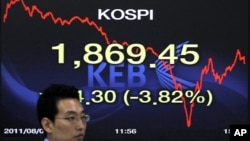Stock markets in Asia continued to slide Monday, despite assurances from credit rating agency Standard and Poor's that its historic downgrade of the U.S. credit rating would have no immediate impact on Asia-Pacific sovereign ratings. Investors are hoping the decline will be short-term if China can stabilize inflation and the U.S. economy does not suffer any further credit rating downgrades.
Stocks in Hong Kong and Japan fell more than 2 percent Monday, the first day of trading after news broke that the United States lost its triple-A bond rating from Standard & Poor's.
Shanghai and Seoul did even worse. It is the first time in history that America has lost its top-rung rating. S&P cited concerns about the nation's growing debt load and uncertainty about Congress' willingness to rein in borrowing.
Also affecting investor confidence are worries that debt-ridden Spain and Italy could follow Greece, Ireland and Portugal in seeking bailouts from the rest of the European Union and raising the risk of a new banking crisis on the continent.
Investors in Asia say these negative economic indicators, coupled with longstanding worries about the high rate of inflation in China, will leave financial markets in Asia unsettled for the short term.
But Peter Lai, director of sales for the Hong Kong securities firm DBS Vickers, says while he expects some swings in Asian stock markets in response to the negative economic news, Asia's strong economies will continue to grow.
“For the long term, I am going to say that, the revival of the economy undoubtedly [will] shift from Europe and America to the Asian countries because the pace of the revival of Asian countries will be much better than those of the Euro countries or the Americans,” he said.
Lai says over time, increased domestic purchasing in Asia and other emerging economies can compensate for declining exports to the stagnant economies in the United States, Europe and Japan.
Anton Gunawan, the chief economist for the Danamon Bank in Indonesia, agrees. He says while a U.S. slowdown will hurt Indonesian exports to a degree, the Indonesian economy is less dependent on America than it used to be.
“More and more we are seeing that the Indonesian export within the region, being Asian countries, increasing rather dramatically," said Gunawan. "Not to mention also Indonesian export diversification to other areas like in Eastern European for example.”
Investors have also been calling on the U.S. Federal Reserve to start pumping money into the American economy again to help underpin the slowing economic recovery.
Ben Kwong, associate director of the investment banking firm KGI Asia Ltd., says any such announcement by the United States would likely have an immediate calming effect on Asia's markets. Action by China to control inflation would also help.
“If there is any positive signs from the U.S. economy, and also some positive signal from China terms of peaking inflation, and that will provide a very good excuse for the Hong Kong stock market to have a strong technical rebound,” he said.
Kwong says while the U.S. economic situation has made the markets a bit volatile for now, investors are projecting stable long term growth in Asia.














